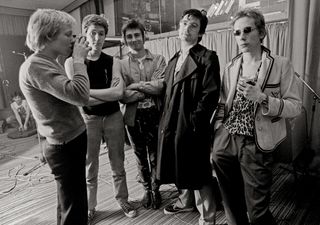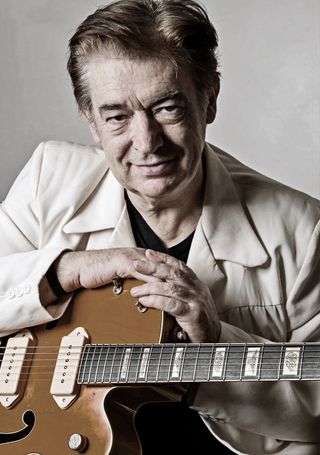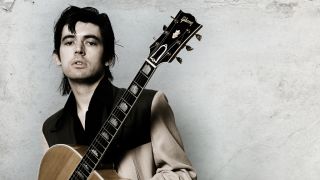Chris Spedding strolls down Denmark Street, aka Tin Pan Alley, glancing at the guitar shops that will soon vanish beneath Cross Rail, and recalls how this central London street was once the epicentre of British rock’n’roll.
“Regent Sounds Studio was here,” he says, “where the Stones and everyone else recorded. The Giaconda café was a few doors down, and that’s where all us musicians would gather. The Sex Pistols’ rehearsal room was up there, on the far corner. When I first arrived in London in the early 1960s, Denmark Street was full of music publishers and I’d come to them to get sheet music of the current hits for the dance bands that I was then playing in.”
Spedding is British rock’s unsung guitar hero. For almost 50 years he has lent his remarkable touch to hundreds – possibly thousands – of recordings. On top of his own dozen-plus solo albums, he can be found on recordings by household names (Elton John, Bryan Ferry), critics’ favourites (John Cale, Harry Nilsson) and cult heroes (Willy DeVille, Frankie Miller). He helped launch the Sex Pistols and The Cramps, turned down an offer to join the Rolling Stones and he’s even briefly been a Womble.
Yet apart from his 1975 hit Motorbikin’, this Zelig figure has never troubled the mainstream. As we walk through central London, no one appears to recognise the 70-year-old, despite his white, David Lynch quiff. Raised in Sheffield, he retains a Northern directness and is refreshingly free of affectation. This could go some way to explaining his lack of bitterness about not having had the same level of success as the likes of Beck, Clapton or Page – or their fortune.
When we’re seated in a nearby pub, Spedding explains: “Some session musicians are bitter, but I had the good luck to have my solo albums as an outlet. Anyway, I never went that route of doing big guitar solos. To me, Jeff Beck is the British rock guitarist I admire the most. He’s a virtuoso. I’m not a virtuoso. I’m a guy who comes up with short, sharp, tasty licks.”
Spedding was born Peter Robinson in Stavely, Derbyshire in 1944. He never met his father, an RAF pilot killed towards the end of WW2, and his mother had him adopted. His new parents, Jack and Muriel Spedding, renamed him and raised him in Sheffield and Birmingham. They were a musical family, with Chris singing in the church choir and studying violin. The arrival of skiffle in 1956 quickly found the youth enthralled with rock’n’roll. A natural guitarist, he moved to London in 1961 and began playing in dance bands that performed the popular hits of the day. These large dance bands, now extinct but once a staple of British light entertainment, provided Spedding with a thorough musical training and were, he says, an incubator for many session musicians.
And it was as a session musician that Spedding would first make his mark: in 1965 he got studio work playing with Dusty Springfield and Paul Jones. In 1967, Pete Brown, the poet best known for writing lyrics to several of Cream’s songs, asked Spedding to join his band Battered Ornaments. The band recorded two albums, ousting Brown during sessions for the second, and Spedding suddenly found himself as the vocalist as well as the guitarist. His first concert as a frontman found Battered Ornaments opening for the Rolling Stones at their August 1969 Hyde Park concert.
Jack Bruce then hired him to play on his debut solo album Songs For A Tailor. Spedding also joined Nucleus, a pioneering jazz-rock band, and this launched his solo career.
“I got voted number two jazz guitarist [after John McLaughlin] in Melody Maker, so EMI wanted me to record a jazz album. When I listened to what I recorded, I wasn’t happy – too much noodling – and asked them not to put it out.”
This refusal to be pigeonholed would define Spedding’s career. His next move was to record a pair of solo rock albums, 1971’s Backwoods Progression and 1972’s Only Lick I Know, before joining former Free bassist Andy Fraser’s new band, Sharks. The guitarist was also building up a healthy book of contacts. When Sharks supported Roxy Music, he came into the orbit of Brian Eno and Bryan Ferry, and he ended up playing on their respective debut solo albums

Despite an increasingly busy schedule, he found time to record a self-titled solo album in 1975. Produced by Mickie Most and featuring_ Motorbikin’_, it found Spedding enjoying his brief moment as a pop star. “When I wrote Motorbikin’ I went straight to Mickie’s and played it to him and he said, ‘That’s a hit!’ He got me out of my contract with Island Records and we got on with recording it.”
Motorbikin’ found Spedding rocking leathers on Top Of The Pops. It was a world away from his previous appearance on the show, when he appeared as a member of The Wombles, the kids’ TV characters who turned into unlikely pop stars. He was dressed as Wellington. “It seemed like good fun,” he says. “I’m not at all ashamed of being a Womble.”
But session work remained a big part of Spedding’s CV. He admits he “got lucky” when he started out. The leading London session guitarists – “the two Jims, Jimmy Page and Big Jim Sullivan” – were both increasingly preoccupied with more lucrative work. Spedding stepped into the breach they’d left, his crisp, economical guitar playing complementing all manner of artists.
“If you were one of the top session guys then you could be working from eight am – when the jingle sessions were held – up to midnight,” he says. “I was young so could handle the long hours. Once, in the early seventies, I was backing Gary Burton at Ronnie Scott’s and we’d finish playing at three am. Then I’d start sessions at eight am. And that was without chemical assistance!”
In 1975, a phone call offered an escape from session work. “My girlfriend answered and said, ‘Mick wants to speak with you,’ and I replied, ‘I don’t know any Micks,’ but she recognised his voice and said, ‘I really think you should take this call.’ It was Mick Jagger asking me if I was free to tour with the Stones in August – but I had already committed to Roy Harper so turned him down.”
In the spring of 1976, an American friend insisted Spedding accompany her to the 100 Club, a former jazz and R&B sweatbox on London’s Oxford Street, to see an unknown and unsigned new band. There were 15 people in the audience at the start, and by the time the band finished playing, there were five people left, including Spedding. The friend who invited him to the gig was Chrissie Hynde, whom he’d met when working in Paris with John Cale. And the name of the band playing that night? The Sex Pistols.
“They had something that was lacking in rock music then,” he says. “They reminded me of what I had first heard in the music of Elvis and the 1950s rockers. So I went to their rehearsal space in Denmark Street and then took them to Majestic Studios in Clapham. We got three songs recorded in five hours. That’s the end of my involvement with the Pistols. There are lots of rumours that I played on Never Mind The Bollocks but it’s not true. I did give their demo to Chris Thomas and that set in motion him producing them.”
Still, the punks recognised a kindred spirit in Spedding – in attitude, if not in age. He played the 100 Club’s first Punk Festival and recorded Pogo Dancing with The Vibrators. Chrissie Hynde sang backing vocals on his 1977 album Hurt, and Slits singer Ari Up credited Spedding with encouraging her to make music. The latter was the daughter of Spedding’s one-time girlfriend Nora Forster, a glamorous German heiress who would later become John Lydon’s wife. “At the studio, Steve Jones checked out my guitars and Johnny Rotten checked out my girlfriend,” he says with a chuckle.

But Spedding was reluctant to take on the mantle of Punk Godfather. While he loved the energy of the movement, he found himself viewed as being “too old”. Instead, he relocated to New York – no less vibrant than London, but much more accepting of anyone over the age of 21. There, he began checking out the scene at punk club CBGB, which led to him producing the first demo by unhinged rockabilly punks The Cramps.
“A lot of my NYC friends considered them hicks because they weren’t from New York,” he says, “but I loved their sound and told them to get to England where they’d find an audience.”
He teamed up with another CBGB veteran, Robert Gordon, and the duo forged a powerful rockabilly sound that, on occasion, they still reunite to perform.
Settling in Los Angeles, the next two decades found Spedding playing on sessions for Tom Waits, Paul McCartney, Roger Daltrey and Joan Armatrading, among many others. Spedding says he loved the California lifestyle and session work, and enjoyed maintaining a low-key solo career. Yet in 2006 he decided to resettle in England. This was partly down to the LA session scene being in decline, while his most regular touring work was with Bryan Ferry, Roxy Music and War Of The Worlds. But he also finally met his birth mother. “It all suggested I should be here,” he says.

Which brings us to today. Spedding’s new album, Joyland, finds him rifling through his contact book once more. Bryan Ferry, Arthur Brown and Andy Fraser all appear on the album, as does ex-Smiths guitarist Johnny Marr. But while Joyland is a testament to Spedding’s undimmed creativity and longevity, it begs one question: why isn’t he better known? At a recent 100 Club performance – with Malcolm Bruce (Jack’s son) on bass – he played a dynamic set that ranged across his career. Yet the venue was only half full. And this for a guitarist whose fingerprints are on so much remarkable music of the last half-century.
Typically, Spedding isn’t one to assign blame. For this modest man, making music is both the means and the end. “I never feel like I’ve done my best work. If I ever do feel that about one of my albums perhaps then I’ll be ready to retire.”

